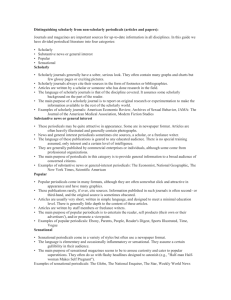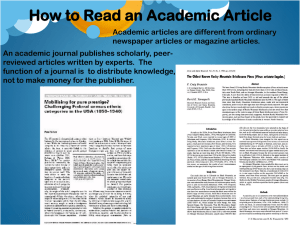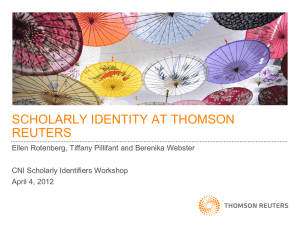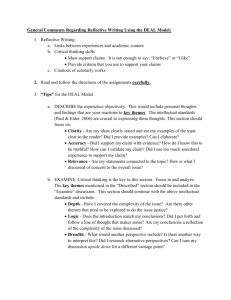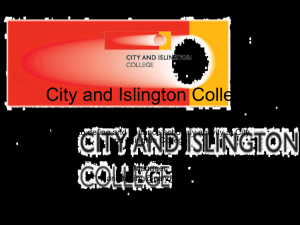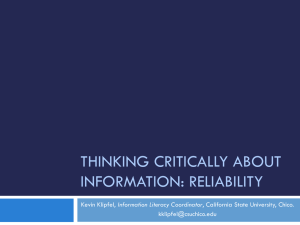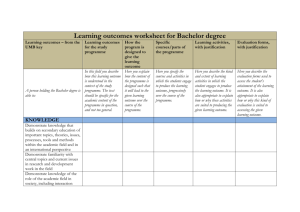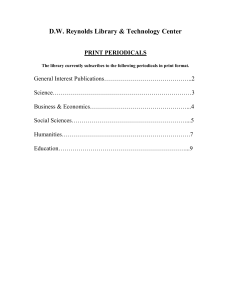Scholarly vs. Popular Video
advertisement
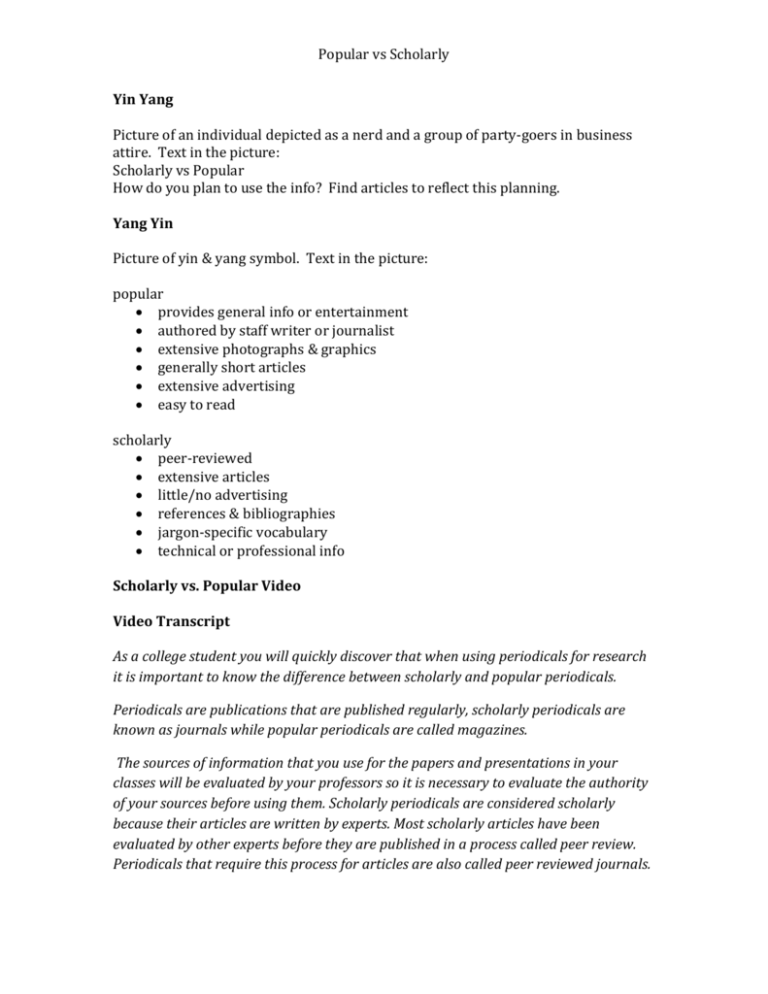
Popular vs Scholarly Yin Yang Picture of an individual depicted as a nerd and a group of party-goers in business attire. Text in the picture: Scholarly vs Popular How do you plan to use the info? Find articles to reflect this planning. Yang Yin Picture of yin & yang symbol. Text in the picture: popular provides general info or entertainment authored by staff writer or journalist extensive photographs & graphics generally short articles extensive advertising easy to read scholarly peer-reviewed extensive articles little/no advertising references & bibliographies jargon-specific vocabulary technical or professional info Scholarly vs. Popular Video Video Transcript As a college student you will quickly discover that when using periodicals for research it is important to know the difference between scholarly and popular periodicals. Periodicals are publications that are published regularly, scholarly periodicals are known as journals while popular periodicals are called magazines. The sources of information that you use for the papers and presentations in your classes will be evaluated by your professors so it is necessary to evaluate the authority of your sources before using them. Scholarly periodicals are considered scholarly because their articles are written by experts. Most scholarly articles have been evaluated by other experts before they are published in a process called peer review. Periodicals that require this process for articles are also called peer reviewed journals. Popular vs Scholarly You will want to use scholarly periodicals as much as possible because they are considered authoritative. If you are able to see the print copies of periodicals it can be easy to distinguish between magazines and journals. Magazines usually have flashy covers and lots of advertisements inside while journal covers are usually plain and contained few or no advertisements. If you find a periodical at a newsstand or in a grocery store is most likely a magazine, journals are usually bought directly from the publisher. You should be aware that newspapers are also considered popular periodicals. If you find an article online however this distinction can be much trickier to make. Here are some things to look for in a scholarly article first you should look for credentials such as Ph.D. or affiliation with the university after the author's name. The article should contain an abstract which summarizes the main points of the article. Many times there will be a short biography establishing the author’s involvement with the subject and possibly listing the author’s credentials. There will also be footnotes or a bibliography at the end of the article listing the author’s sources of information. This allows the reader to consult and verify the material the author use. A scholarly article will also contain specialized vocabulary showing that the author has in-depth knowledge of the subject. The length of the article is useful to look at as well. Popular articles are usually brief, one to five pages whereas scholarly articles are usually much longer. While doing research you may come across trade or professional publications which are written for a very specific audience, such as managers or administrators in business, finance, and industry. Articles found in these publications are sometimes written by experts and other times are written by journalists. They're published quickly to alert people in a particular business of new trends our technology so even though the author maybe an expert it is unlikely that articles have gone through a peer review process. You should use these articles cautiously. Lastly you should know that there are some gray areas when deciding if an article a scholarly or not, so if you have questions about whether you should use an article for a paper or project you should consult your professor. The Popular Jock & The Know-It-All Nerd This is the difference between what your best friend told you to do about that crazy thing growing on your tongue and what the doctor did for you when it turned black and got swollen and you finally went to the hospital. This is the difference between the guy on TV who tells you that you should take all your money and buy gold because gold stands the test of time and the qualified Popular vs Scholarly investment banker who helps you carefully put your money in a few savings and retirement accounts, and then starts you on building an investment portfolio. In short, this is the difference between some guy who kind of knows what he's talking about and an expert. Does It Matter? Let's look at two scenarios; one is writing for a popular magazine such as Newsweek and the other a scholarly journal such as the Journal of the American Medical Association. 1. A journalist is writing an article on Alzheimer's Disease for Newsweek and did a lot of reading before he wrote his piece. 2. A professor is writing an article on Alzheimer's for the Journal of the American Medical Association. She actually performed the research that the writer for Newsweek referred to. Which is better? The original information, written by the person who did the research in the first place and truly understands it, or the watered-down version made by the secondary reporter? Self-Reflect So is Ladies Home Journal a popular or scholarly source? Why? Picture of a cover from Ladies’ Home Journal.
